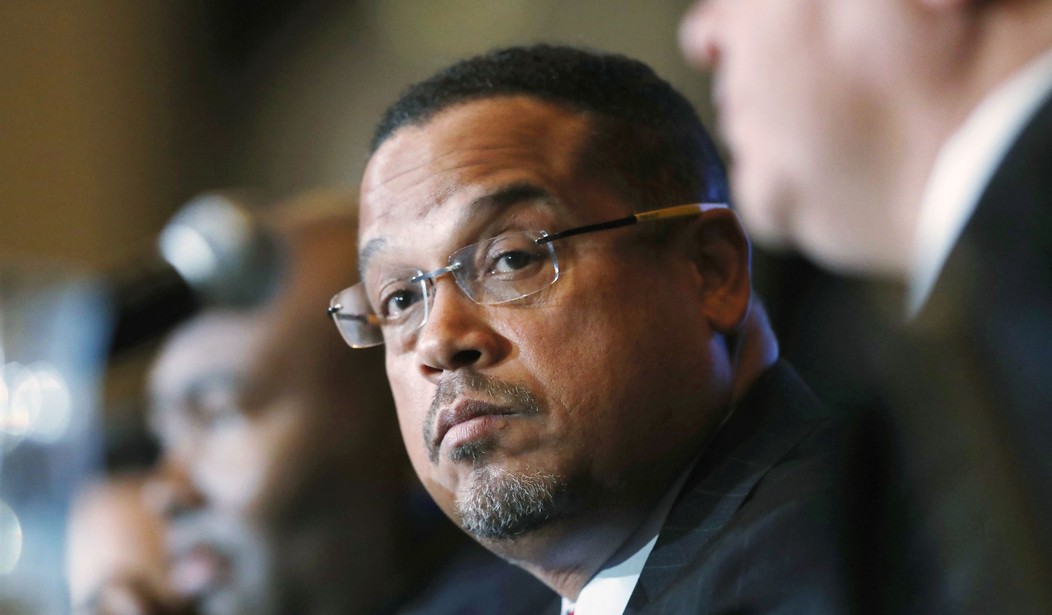Minnesota has long infringed on the right of 18- to 20-year-olds to bear arms. That’s going through a legal challenge in the post-Bruen landscape. As Cam has covered here before, Biden-appointed U.S. District Judge Katherine Menendez grudgingly but honestly applied the Bruen test and struck down the carry ban on young adults, and followed that up by staying her order to allow the State to file an appeal with the Eighth Circuit.
It’s been about 2 months since and the State just filed its appeal, signed by none other than AG Keith Ellison, whom I fondly call Attorney General Antifa. Keith Ellison isn’t a particularly savory character. The former Congressman has been accused of domestic violence, with contemporaneous documentation posted by his ex-girlfriend. The Attorney General also posted, and then deleted, an image of himself holding the “Antifascist handbook.” So much for the State’s top lawyer!
Photo from a now-deleted tweet in 2018 by Keith Ellison, Minnesota’s attorney general who at the time was DNC deputy chairman. Ellison tweeted that the Antifa handbook should “strike fear in the heart” of Trump. He supports domestic terrorism that ravaged Minneapolis pic.twitter.com/t5XQgKwqqU
— Bill Gertz (@BillGertz) May 30, 2020
So, what’s in the appellate brief that’s outrageous? Look at Page 6 (Summary) of the PDF:
On the first question, the textual inquiry, people under 21 are not within “the people” intended by the Framers. It is an undisputed fact that during the founding era, 18-to-20-year-olds were minors without the full spectrum of legal rights that adults had. People under 21 were “infants” in the eyes of the law, lacking in judgment and existing under strict parental authority. Minors did not have the independent right to carry a gun in public for self-defense.
This is wrong on several levels and it’s unbelievable that the State would write something like this in its brief. There are 16 instances of “minors under 21” in the document. The brief also says that “At common law, people under 21 were minors, also known as “infants,” throughout both periods.” (Both periods being ~1791 and ~1868.) On Page 17, it points out that 18- to 20-year-olds did not have the right to vote but stays mute on the 26th Amendment that has since been passed.
It doesn’t get better:
Further, states have historically regulated groups believed to be dangerous with guns to ensure the public safety. Because “the people” did not include minors at the time of the founding, Section 624.714 is constitutional. The Court’s inquiry need go no further.
Who has been among “historically regulated groups” with limited access to guns? Racial minorities like African Americans and Native Americans, and religious minorities like Catholics. Keith Ellison ought to know better; he’s black and a practicing Muslim. In fact, around 17 years ago, then-Fox News host Glenn Beck asked Ellison a really awful question, asking the latter to prove to him that he wasn’t working with our enemies, which understandably angered Ellison. (Glenn Beck himself belongs to another religious minority that has been persecuted horribly in the past.) But that didn’t stop Ellison’s office from invoking old racist laws.
The brief also has this whopper:
A duty to defend one’s state and country does not create a right to arms for defense of self.
This just doesn’t compute. I’ll leave it at that.
On Page 22, the brief has this flat-out awful header:
From the Founding, States have had the Power to Regulate Guns in the Hands of Irresponsible or Dangerous Groups like People Aged 18-to-20.
The Bill of Rights is largely about the rights of individuals, not groups. This is pure stereotyping that wouldn’t fly on some other trait, such as race, sex, religion, or sexual orientation. Can you imagine a law that uses racial crime statistics to ban an entire race from possessing arms? Likewise, men commit most violent crimes. What about a law that disarms all men?
When you’re an adult, you’re an adult, and the Bill of Rights is applicable to you irrespective of what other people with your traits do. I’m not responsible for the good deeds or crimes of other Indian immigrants; nor are they responsible for mine.
Status-based restrictions varied over time, and included, for example, Catholics, Native Americans, slaves, people who would not swear a loyalty oath to the government. Jackson, 69 F.4th at 502–03; Kanter, 919 F.3d at 458 (Barrett, J., dissenting). While our sensibilities regarding regulating certain groups have evolved, one thing has not changed: legislatures have the power to regulate groups based on dangerousness.
If our rights were legislated away based on our group memberships, that would be fundamentally anti-American. Yet, that’s what Ellison’s office wants to do. Regardless, claims that a group of people is inherently dangerous and it’s in the government’s interest to disarm them is interest balancing, something that the Supreme Court said is a no-go.
The States responded to mass-market availability of cheap handguns and the ratification of the Fourteenth Amendment by enacting a host of age-restrictions to reduce the risk of danger and ensure public safety.
Unfortunately for us, the Court also left a tiny opening for gun grabbers by suggesting a nuanced approach to cases implicating “unprecedented societal concerns or dramatic technological changes.” Minnesota is trying to milk this to full effect by claiming that technological advancement justifies infringing on the rights of young adults.
This case will take a while to resolve, hopefully with the right outcome and with a well-deserved smackdown of Ellison’s arguments.







Join the conversation as a VIP Member